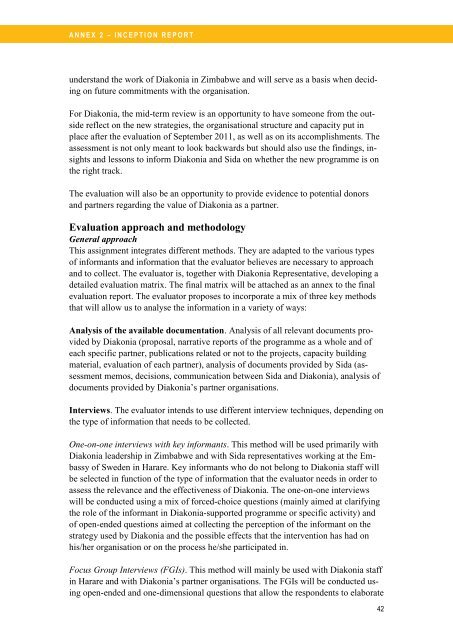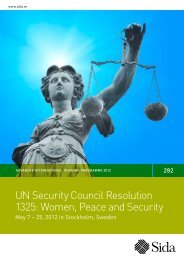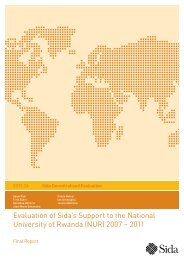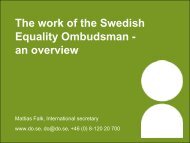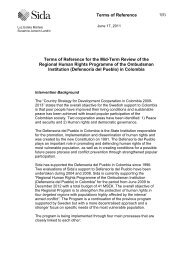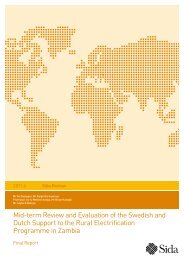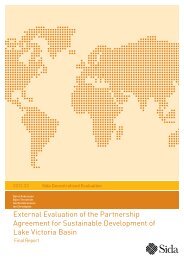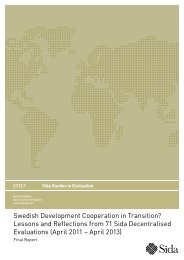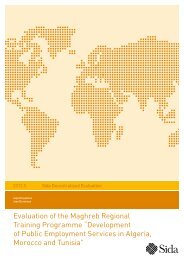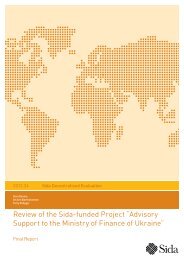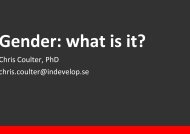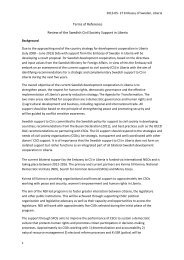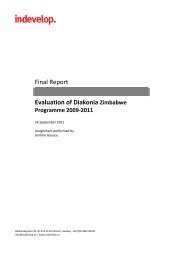Mid-term Review of the Diakonia Strategic Peace Building ... - Sida
Mid-term Review of the Diakonia Strategic Peace Building ... - Sida
Mid-term Review of the Diakonia Strategic Peace Building ... - Sida
You also want an ePaper? Increase the reach of your titles
YUMPU automatically turns print PDFs into web optimized ePapers that Google loves.
A N N E X 2 – I N C E P T I O N R E P O R T<br />
understand <strong>the</strong> work <strong>of</strong> <strong>Diakonia</strong> in Zimbabwe and will serve as a basis when deciding<br />
on future commitments with <strong>the</strong> organisation.<br />
For <strong>Diakonia</strong>, <strong>the</strong> mid-<strong>term</strong> review is an opportunity to have someone from <strong>the</strong> outside<br />
reflect on <strong>the</strong> new strategies, <strong>the</strong> organisational structure and capacity put in<br />
place after <strong>the</strong> evaluation <strong>of</strong> September 2011, as well as on its accomplishments. The<br />
assessment is not only meant to look backwards but should also use <strong>the</strong> findings, insights<br />
and lessons to inform <strong>Diakonia</strong> and <strong>Sida</strong> on whe<strong>the</strong>r <strong>the</strong> new programme is on<br />
<strong>the</strong> right track.<br />
The evaluation will also be an opportunity to provide evidence to potential donors<br />
and partners regarding <strong>the</strong> value <strong>of</strong> <strong>Diakonia</strong> as a partner.<br />
Evaluation approach and methodology<br />
General approach<br />
This assignment integrates different methods. They are adapted to <strong>the</strong> various types<br />
<strong>of</strong> informants and information that <strong>the</strong> evaluator believes are necessary to approach<br />
and to collect. The evaluator is, toge<strong>the</strong>r with <strong>Diakonia</strong> Representative, developing a<br />
detailed evaluation matrix. The final matrix will be attached as an annex to <strong>the</strong> final<br />
evaluation report. The evaluator proposes to incorporate a mix <strong>of</strong> three key methods<br />
that will allow us to analyse <strong>the</strong> information in a variety <strong>of</strong> ways:<br />
Analysis <strong>of</strong> <strong>the</strong> available documentation. Analysis <strong>of</strong> all relevant documents provided<br />
by <strong>Diakonia</strong> (proposal, narrative reports <strong>of</strong> <strong>the</strong> programme as a whole and <strong>of</strong><br />
each specific partner, publications related or not to <strong>the</strong> projects, capacity building<br />
material, evaluation <strong>of</strong> each partner), analysis <strong>of</strong> documents provided by <strong>Sida</strong> (assessment<br />
memos, decisions, communication between <strong>Sida</strong> and <strong>Diakonia</strong>), analysis <strong>of</strong><br />
documents provided by <strong>Diakonia</strong>’s partner organisations.<br />
Interviews. The evaluator intends to use different interview techniques, depending on<br />
<strong>the</strong> type <strong>of</strong> information that needs to be collected.<br />
One-on-one interviews with key informants. This method will be used primarily with<br />
<strong>Diakonia</strong> leadership in Zimbabwe and with <strong>Sida</strong> representatives working at <strong>the</strong> Embassy<br />
<strong>of</strong> Sweden in Harare. Key informants who do not belong to <strong>Diakonia</strong> staff will<br />
be selected in function <strong>of</strong> <strong>the</strong> type <strong>of</strong> information that <strong>the</strong> evaluator needs in order to<br />
assess <strong>the</strong> relevance and <strong>the</strong> effectiveness <strong>of</strong> <strong>Diakonia</strong>. The one-on-one interviews<br />
will be conducted using a mix <strong>of</strong> forced-choice questions (mainly aimed at clarifying<br />
<strong>the</strong> role <strong>of</strong> <strong>the</strong> informant in <strong>Diakonia</strong>-supported programme or specific activity) and<br />
<strong>of</strong> open-ended questions aimed at collecting <strong>the</strong> perception <strong>of</strong> <strong>the</strong> informant on <strong>the</strong><br />
strategy used by <strong>Diakonia</strong> and <strong>the</strong> possible effects that <strong>the</strong> intervention has had on<br />
his/her organisation or on <strong>the</strong> process he/she participated in.<br />
Focus Group Interviews (FGIs). This method will mainly be used with <strong>Diakonia</strong> staff<br />
in Harare and with <strong>Diakonia</strong>’s partner organisations. The FGIs will be conducted using<br />
open-ended and one-dimensional questions that allow <strong>the</strong> respondents to elaborate<br />
42


